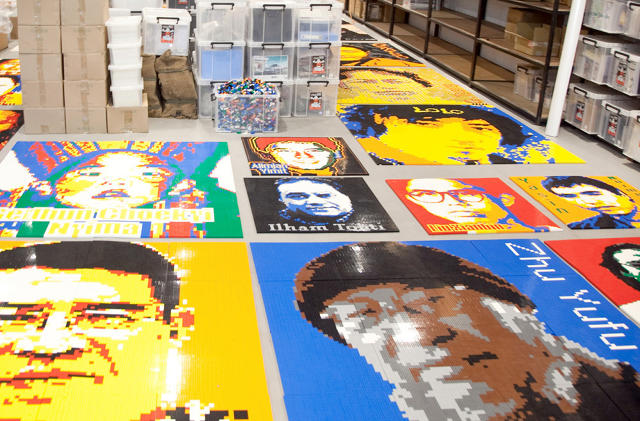In an October 21 Instagram post, artist Ai Weiwei revealed that Lego refused to sell him a bulk order of bricks for a forthcoming installation at the National Gallery of Victoria, in Melbourne, Australia, on political grounds. The question: are Lego's motives about "censorship," as Ai alleges? Are they a cop out from a corporation trying to cover its ass? Or are they about a toy company that just wants to keep its focus squarely on making toys?
"As a company dedicated to delivering great creative play experiences to children, we refrain—on a global level—from actively engaging in or endorsing the use of Lego bricks in projects or contexts of a political agenda," Lego spokesperson Roar Rude Trangbaek told Co.Design via email. "In cases where we receive requests for donations or support for projects—such as the possibility of purchasing Lego bricks in very large quantities, which is not possible through normal sales channels—where we are made aware that there is a political context, we therefore kindly decline support."
In the October 21 post, Ai also pointed out that Lego and the Chinese government recently signed a deal to open a $300 million Legoland theme park in Shanghai, implying a connection with his bulk order going unfulfilled. In an October 25 Instagram post, Ai wrote: "Lego's refusal to sell its product to the artist is an act of censorship and discrimination."

Trangbaek mentioned that while Lego can refuse to fill bulk orders at its discretion, that it's not outright banning the sales to any individual or entity.
"We respect any individuals' right to free creative expression, and we do not censor, prohibit or ban creative use of Lego bricks," he said. (Co.Design has covered many creative projects that use Lego as a subject or medium.) So someone who wants to use Lego bricks can do so, but they'll have to buy them like any paying customer.
Ai's installation will carry a message of free speech. When it comes to using Lego bricks, though, it seems that will come at a price.
"Any individual person can naturally purchase Lego bricks through normal sales channels or get access to Lego bricks in other ways to create their Lego projects if they desire to do so, but as a company, we choose to refrain from actively engaging in these activities—through for example bulk purchase." Lego declined to comment on the price difference between retail and bulk orders.
Trangbaek says that this policy has been around for decades and as CNN reports, the company has tried to remove itself from any type of political messaging, from disputes between Royal Dutch Shell (with which Lego had a promotional contract) and Greenpeace to blocking an idea to create a Supreme Court–themed set under a "no politics or political symbols" rule.
It's worth noting that Ai specified Lego bricks for his @Large installation, which appeared on Alcatraz from September 2014 through April 2015. Trace, a piece appearing in the show, was composed of 1.2 million bricks, which the show's organizer, FOR-SITE, obtained for the artist. In this situation, FOR-SITE asked for an in-kind donation (not to fill a bulk order as in the case of the Australian exhibit) and there was no formal notice from the corporate office declining to fill the donation. In fact, there was no response from the corporate office at all. Alison Konecki, development & outreach associate at FOR-SITE, issued the following statement:
In the early stages of developing Ai Weiwei's @Large installation, Trace, which utilized 1.2 million Lego bricks, FOR-SITE Foundation contacted Lego's corporate headquarters in Denmark with a request for an in-kind donation of materials. We did not receive a response, and subsequently reached out to several departments at U.S.-based Lego Systems Inc. with the same request, explaining that we were seeking Lego bricks for a project with artist and activist Ai Weiwei exploring freedom of expression and individual responsibility. Although our request for support was declined, we were referred to members of the Lego U.S. sales and customer service team who facilitated the transactions for numerous bulk orders shipped both to us and directly to the studio in Beijing for the project.
When asked about the @Large installation, Trangbaek responded: "We do not comment on our dialogue with partners, customers, consumers, or other stakeholders."
Judging from the hundreds of comments on Ai's photos voicing support, a least a large slice of the public seems to have sided with his stance. However, Guardian critic Jonathan Jonas writes that: "I am shocked that someone who has experienced what it is to be oppressed by an authoritarian regime...would be so glib as to confuse a clumsy PR move with actual 'censorship.'"
Yes, the refusal to "actively" sell a bulk order to Ai is a silly, backwards policy. But censorship?
Ai has since started a campaign to defend the freedom of political art, which consists of second-hand BMW 5S Series sedans that will become collection points for Lego bricks. The donations have already begun.
Companies like Etsy, Starbucks, and Dove have incorporated "do good" social initiatives as part of their messaging—some more successful than others.
Free speech seems like a no-brainer cause to support in this day and age, but as a corporation, Lego has the discretion to support—or not support—what it pleases. Perhaps a better solution moving forward would simply be to open up bulk ordering for everyone who is willing to pay.
Follow @aiww on Instagram for updates.